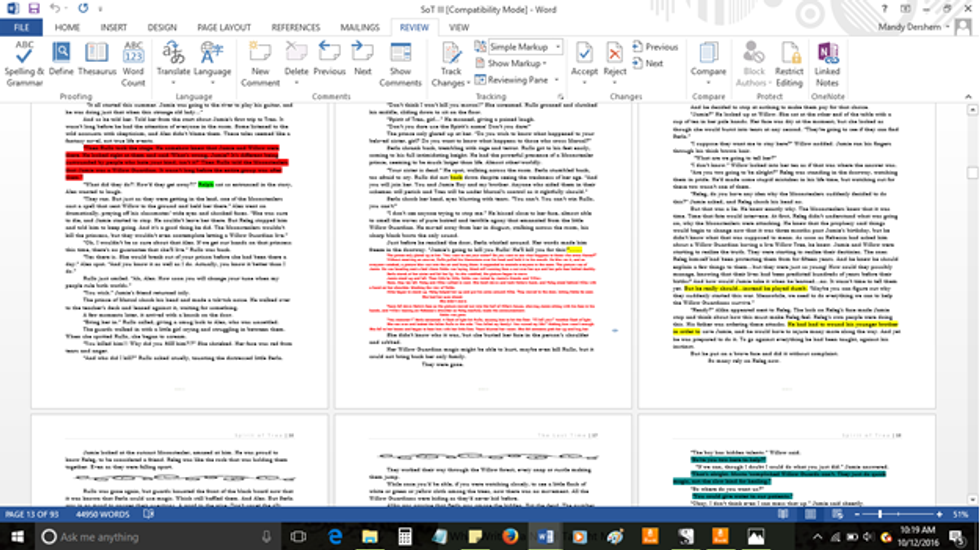I started writing in middle school as a way to pass the time. For six years, I have been slowly but surely working on the same story I started with. Now I'm going to share with you some of the things novel writing has taught me.
- Patience and Stamina. Long Fiction Writing is all about delayed gratification. In order to reach the most exciting bits, you must first wade through the set-up. And then the boring scenes. And then the editing. Just to do it all over again for the next drafts. Most novels are between 80,000 and 100,000 words and take an average of a year or two to write…for a professional writer. For an amateur writer like me, it takes a lot longer than that. Writing has been a test of both endurance and dedication for the last six years of my life.
Some of my writing notes.
- Objectiveness. Editing requires a steady hand. Sentences that you find impressive have to be cut in order to declutter the story. Scenes that you fell in love with may be taking up space where something more relevant could go. Part of writing is remembering that the end product caters to a reader—not you. If it only makes sense in your head or if it only sounds good in the heat of your creative process, then you have to be strong enough to let it go. I’ve heard it said that most professional authors write an average of 2,000 words a day. Crazy, right? That’s over 700,000 words a year, when most novels are around 80,000 words. Even if a writer had more than one project in a year, that’s a lot of deleted words.
This was a first draft I wrote in middle school and my favorite work at the time. It was 44,950 words long. Nothing survived from that draft except character names and main ideas.
- Confidence. Writing, especially in formal works, can feel constricting. It is difficult to write within the parameters of a sentence structure. Did you know that there are even rules for which order you can place your adjectives in? Creative Writing is learning not only how to function but how to flourish within writing parameters. Learning when to break rules for style and when to maintain the grammatical structures we know so well (or not so much) takes up a lot of a writer’s time.
- Organizing. I’m not an overly organized person. But there are very few writers who can construct a detailed, complex story without some kind of organizing system. We’ve all seen the movies where characters will be missing a wound or wearing different clothes in the middle of the same scene. The states of your characters, the time it takes to reach different locations, the time frames of various events, and many other things have to be consistent throughout an entire work. Unless you have an amazing memory, you have to suck it up and start plotting out your tale.
A screenshot of Scrivener, a writing software. It has a handy notecard feature to help writers organize their scenes.
- Understanding. Characters have to feel like real people. Real people are messy and emotional and sometimes mean. Taking the time to explore characters has taught me more than I can say about the people around me. We operate on our desires, for better or worse, and desire is the driving force of conflict—both in stories and in life.




 Some of my writing notes.
Some of my writing notes. This was a first draft I wrote in middle school and my favorite work at the time. It was 44,950 words long. Nothing survived from that draft except character names and main ideas.
This was a first draft I wrote in middle school and my favorite work at the time. It was 44,950 words long. Nothing survived from that draft except character names and main ideas.
 A screenshot of Scrivener, a writing software. It has a handy notecard feature to help writers organize their scenes.
A screenshot of Scrivener, a writing software. It has a handy notecard feature to help writers organize their scenes.
















